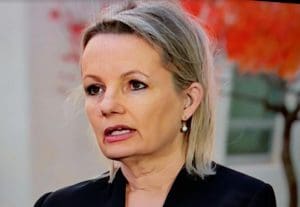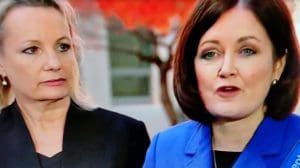
Liberal MP Sussan Ley in Canberra today
LIBERAL MP Sussan Ley has proposed phasing out live sheep experts to the Middle East within five years in a Private Members Bill introduced to Federal Parliament this morning.
However, the Live Sheep Long-Haul Export Prohibition Bill designed to immediately end the Middle East northern summer trade, was not debated after its introduction, despite having the support of seconder, the Liberal Member for Corangamite Sarah Henderson and the Member for La Trobe Jason Wood.
The Bill is also reportedly expected to get the formal support of the Labor Party this week with Labor’s Agriculture spokesman Joel Fitzgibbon telling ABC’s AM he would recommend it be supported by the shadow cabinet and the party room. Mr Fitzgibbon and the Liberal MPs indicated there would be more lobbying of MPs to canvass support for action before a vote on the Bill.
Mr Fitgibbon said in an interview this morning there was still an opportunity to not proceed with a Private Members Bill, “but have the Government work with the Labor Party and the cross-benchers to put in place an orderly transition, and in doing so, to create more value-adding in Australia, and of course, therefore, more jobs in Australia.” He said a number of Liberal back-benchers had approached him expressing concern about the northern summer trade and indicating they are considering supporting the Bill.
“Well if Labor can restore its numbers to 69 and you work on the basis that Sussan Ley and Sarah Henderson, although I see Sarah Henderson this morning has expressed her reluctance to support a Suspension of Standing Orders.
“But two of them would take us to 71 and if we have 3 cross-benchers, with 74 we are close to the 76 we need to form an absolute majority and therefore suspend Standing Orders in the House.”
Bill would prohibit Gulf sheep shipments in northern summer
Introducing the Live Sheep Long-Haul Export Prohibition Bill, Ms Ley said it would insert a new section in the Australian Meat and Livestock Industry Act 1997 stating that a condition of a livestock export licence would be that sheep and lambs not be exported from Australia by ship to any place in the Persian Gulf or the Red Sea or accessed via water bodies during July-September if the voyage is 10 days or more.
“The transition period is five years.”
Ms Ley said she had spent more than half her life close to Australia’s rural and pastoral industries.
She said the case for continuing long-haul live sheep exports fails on economic and animal welfare grounds and only 6 percent of Australia’s sheep and lamb offtake is exported live, mostly from Western Australia.
“In WA the mutton price is 20 times greater than it was 20 years ago, processing has built these markets.
“We can identify and fast-track new development in WA abattoirs and create more jobs and greater value-adding,” she said.
“If we set a five-year end-date, investors can have the certainty and confidence to build new processing capacity.”
Ms Ley said live sheep trade is in terminal decline, with numbers dropped by two thirds in the last five years.
“It is based on just two customers in two countries; Kuwait and Qatar, who account for 70pc of exported sheep.”
She said the demand for live sheep comes from its cheap retail price and government subsidies, not cultural or refrigeration reasons.
“Ninety nine percent of consumers in the Gulf have refrigeration and every Midde Eastern country accepts halal slaughter, the subsidies are phasing out.
Ms Ley said Bahrain ended their subsidies in 2015 and went from 325,000 live sheep from Australia to zero, replacing this with carcasses transported via air freight.
She said the live export trade is an industry built on a model of animal suffering and was not confident the McCarthy Review recommendations will go far enough with more research being called for into a heat stress assessment model.
“Perhaps we should accept the existing overwhelming evidence of poor animal welfare associated with these voyages.
“It is farmers who have been deceived, by an export industry that has for 33 years and countless second chances been very good at talking the talk and downright culpable when it comes to walking the walk,” she said.
“Exporters do not comply with the rules, much of the export chain lies outside Australia’s legal jurisdiction, in international waters and overseas countries,” she said.
“As one WA consultant to the trade told me, regulations written on paper in Australia, ceased to mean anything once the ship departs.
“In the modern world, ethics and sustainability in the production of food and fibre are vital … sanctioning further voyages on these ships of shames, particularly into a Middle Eastern summer damages our brand,” she said.
“Australians will no longer accept rural export industries with animal welfare practices that are inferior to those our farmers willingly comply with every day.
“Nor will they understand the logic of putting our clean green sheep meat industry at risk for a sector that is one-tenth the size, in decline and actually competes with our domestic production.”
Animal welfare should underscore MP decisions

Liberal MPs Sussan Ley and Sarah Henderson outside Federal Parliament
Outside parliament, Ms Ley said the animal welfare case agains live sheep exports has been very well made and should underscore the decisions members of parliament will make in relation to this Bill.
“In the modern world we cannot support what is essentially a 1950s model of business.
“This is not about farmers or the live trade or the animal welfare lobby, it’s about the sensible right thing to do.”
Ms Henderson said the people of Corangamite were saying “enough is enough” after decades of non-compliance and inhumane treatment of sheep and tolerating a trade which continued to tarnish Australia’s international reputation.
She said the Federal Government’s “swift and strong” response to the footage of sheep suffering and dying in overheated conditions on the Awassi Express last year and commended Agriculture Minister David Littleproud’s efforts to hold rogue exporters to account.
“But Mr Speaker we need to do more.”
She said the Bill’s 5-year transition was a responsible lead time and would allow farmers and the industry to transition to chilled lamb and mutton carcase exports.
Bill will facilitate more discussions
La Trobe MP Jason Wood said he had always been personally opposed to live animal exports, but had never called for a ban. He said it was not acceptable for Australian sheep to die in international waters, suffer heat stress, lack of ventilation, lack of water, dying in cruel inhumane conditions.
“To me that is not acceptable and that is why I’m supporting Sussan with her Private Members’ Bill to ban long-haul sheep exports to the Middle East, that’s what this is about.
“It’s about making a sensible decision in support of what the community expects us to do as a Members of Parliament.”
Mr Woods commended Mr Littleproud on his responses to the McCarthy Review, but was keen to work with him on ensuring independent vets were on live sheep vessels and that the Department of Agriculture and Water Resources was not be the regulator.
“Whereas if we didn’t have the Private Members’ Bill there probably wouldn’t be those discussions.”
When asked if she was prepared to suspend standing orders to bring the Bill on in the Parliament, Ms Ley said: We won’t be playing any games on the floor of the House.”
“So the answer to that question is ‘no’.
“This is not about playing political games, this is about building support among our colleagues and demonstrating that support through the forms of the party room, the conversations that we have in this building and making a really strong case – and I believe we can,” she said.
“This Bill has not been introduced as a flag-waving exercise; of course we want to see it debated, we want to see it moved to the second reading stage.
“We saw in the (same sex) marriage debate quite a few Bills enter the House – eventually the outcome happened – I see this in a very similar way.
“We are not just walking from this today after the introduction of the Bill; we are working very hard to make the case as we should.”



Then sell your sheep when they are lamb, before they become mutton. And given the productive life of a sheep before they are cast for age, five years is more than enough to transition out of this trade. I note no-one in WA admits that the trade is actually already in decline, or why they think that might be. Because things are changing in the Middle East, look at Bahrain and you will find the answers. So stop talking nonsense that this cannot be done; and on animal welfare grounds, it demands to be done.
How any of you can justify a trade knowing that thousands of animals will suffer and die a horrible death totally escapes me. If you, as a farmer, support this trade, then please do not scream if the Australian public lay the blame on you. It’s a pity that the rest of us farmers have to be tainted by your actions. You do the image of Australian farmers generally a terrible disservice.
Jo, could I refer you to Sussan Ley’s first reading speech to the House of Representatives, where she addresses the points you raise.
I know nothing about sheep, but would be interested to know what the pollies mean by ‘transition’ and in what form that is to take. In reality, to have an entire herd of livestock and change fundamentally the sires and direction of market target would take many years longer than five years, let alone the cost. Considering the Australian abattoir processing sector is largely calling for lamb, not mutton. What transition do the pollies expect or can provide in market development for mutton export? What have they done in the past to this same end?
The racists are out in force. No respect for the right of people in third world countries to have access to food in a way that suits their cultural, practical and religious needs. In addition to that, they want to impose a lock-out on Australian farmers. If as it is claimed there is a trend to boxed meat the market place will deliver that over time.
Just remember that we have the highest processing costs in the world. This is deducted from the price received by farmers.Thank you to the MP’s in Canberra for the high processing costs, particularly the ALP.
Courageous start Sussan Ley and Sarah Henderson. Farmers across Australia need to become activist and actively support Ley and Henderson. We need to protect our national image of clean green ethically produced food and fibre. The head-in-the-sand attitude of Western Australian sheep producers puts at risk our valuable live cattle exports out of Derby and Brisbane and dairy breeders out of the south.
The girls won’t be going around country Western Australia anytime ever. When you see Wellard’s set-up, there is lots of money invested. Henderson will be phased out by Labor and Ley will have more time to check her investment property’s out at her own expense, not ours, with the pre-selection in her very rural seat.